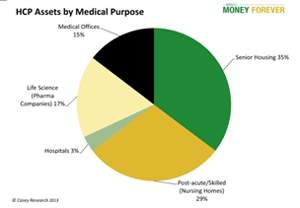This REIT is widely-diversified geographically, as well as in the types of properties it buys. And with a consistent, growing dividend, now’s the time to buy, says Dennis Miller of Miller’s Money Forever.
HCP (HCP)—a health-care REIT—took a hit in 2008 like many other real-estate investments, but many bounced back a lot quicker than other REITs.
While researching the choices in the health-care sector, HCP stood out. From the firm’s core operating principles, you can quickly see why.
HCP only invests when a good opportunity presents itself. In a recent earnings call, an analyst asked why HCP was making fewer acquisitions than many others (although the company is still making plenty). One of the executives answered that you don’t swing at every ball the pitcher sends your way. That’s our perspective as well. It’s not just about hitting home runs, but knowing when not to swing as well.
Geographic diversification is also very important. While some places like California aren’t our favorite locations, if it's within a diversified portfolio with strong allocations in Texas, Pennsylvania, Ohio, and Florida, among other states, the portfolio is diversified enough to mitigate the risk.
In addition to geographic diversification, we don’t want to get stuck in just one type of property, such as hospitals or medical offices. With more and more health-care regulation coming through, certain types of buildings—such as nursing homes—will be more affected than others.
The impact isn’t enough to crush those operators, but I certainly wouldn’t want a portfolio of 100% nursing homes in light of the new law. With a diverse mix of properties, HCP protects itself from being exposed to any single change in legislation.
When interest rates rise, REITs are sometimes squeezed on two or even three fronts. With higher interest rates, there will be fewer buyers in the market, meaning real estate prices will drop.
Second, if the REIT wishes to purchase new properties, it will have to pay higher rates to do so. And third, if the REIT was borrowing with variable-rate loans, costs will go up regardless of what happens. However, HCP largely avoids that since 93% of its portfolio is in fixed-rate loans.
If interest rates rise, does that mean HCP is toast? Not necessarily...REITs are not like bonds. When rates go up, bond prices must go down. On the other hand, higher rates will put pressure on REITs, but will not necessarily crush them.
We could have a scenario where there’s a really strong real-estate recovery matched with rising rates—the surge in demand could possibly offset the higher rates. This is a possibility, but we wouldn’t necessarily bet on it. When rates start to rise, we’ll likely look for the exit door.
Nearly every single property owned by HCP is leased on a triple-net basis, meaning the tenant pays his rent, along with the property taxes, the insurance, and the maintenance of common areas. Around half of HCP’s leases will expire in 2022 or later. And HCP’s leases are written to either adjust to the CPI or sometimes to include a fixed annual increase.
HCP has increased its dividends for 27 years, and has no plans of stopping now.
While we think the company is a solid pick, there isn’t too much meat on the bone here under current conditions. For the stock to move upward, something new needs to happen, like another push up in the real estate market. Looking at the trend thus far, there’s a good chance of that happening.
The good news is that the downside isn’t particularly large. The stock could retrace its steps a bit, but I don’t see it dropping 20% overnight. So put in a 20% trailing stop, pick up some regular dividends, and keep an eye on this stock.
Subscribe to Miller's Money Forever here...
Related Articles:











